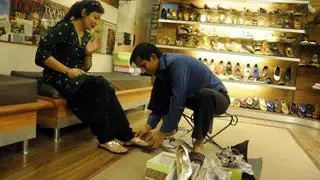“Covid-19 has done to the hygiene segment what demonetisation had done to digitisation,” declares Rakesh Sharma, Founder and Managing Director of Quick Smart Wash, a linen rental and campus laundromat start-up.
The Jaipur-based company is awash with big plans to revolutionise the professional laundry business in India.
Quick Smart Wash (QSW) has just entered into a partnership with Japanese firm Elan Corp, which is into laundry services and linen rental for nursing care. Riding on Elan’s expertise, QSW hopes to scale up rapidly from the current 12 to 15 tonnes of laundry it does in a day, to at least 110 tonnes a day in the next 24 months.
Sharma’s projections are based on the growth it saw during the pandemic, when despite its college campus business being hit, it still grew overall by 20 per cent – thanks to the healthcare business scaling up.
A virgin market
In 2013, Sharma, who had been working in the steel sector plunged into the laundry business, after an extensive survey of the landscape.
He found the market size of the laundry business was nearly $25 billion, but 90 to 95 per cent was unorganised.
“We zeroed in on industrial laundry as the demand for professional services was more here,” he says. QSW started off in college campuses initially.
The first contract QSW got was from BITS Pilani, where it installed coin-based laundromats. The first year was tough, admits Sharma, but once the parents inspected the service, it picked up rapidly. The next year, the service expanded to Amrita Vishwa Vidyapeetham in Coimbatore and Manipal University.
However, says Sharma, it struck him that the campus business only had revenue accumulation for 10 months, whereas his manpower costs were for 12 months.
That’s when he decided to expand into hospital laundry.
“Not too many organised players did hospitals, as it was a challenging proposition – given the infections and high sanitisation requirement,” he says.
QSW started off with local hospitals in Jaipur, but today 80 per cent of Manipal Hospital’s laundry needs are taken care of by the company, he says, and it is adding more hospitals to its operations.
Linen management
The move into hospitals helped QSW do value additions and boost its margins. For instance, early into hospital operations, Sharma realised that it was better to take charge of the linen as well, and hospitals were only too happy to outsource this too. “From the beginning, we were building solutions rather than just providing service,” says Sharma.
With Japanese firm Elan, which has taken a 12.85 per cent equity stake in the company, bringing in quality and compliance, Sharma hopes to scale up from the 12,000 hospital beds it services today to reach 24,000 beds.
Sharma is full of ideas on scaling up the venture, especially as he has studied the opportunity well.
In healthcare alone, he says there are 25 lakh beds in the country. “One bed can generate five to six kgs of business daily,” he points out.
Beyond healthcare, he points out that Railways is another lucrative vertical. During the pandemic, the Railways stopped its bedding services, but there are reports of it outsourcing linen rental.
Meanwhile, Quick Smart Wash has already made inroads into work-wear in the pharma sector. It takes care of the uniforms at the vaccine maker Serum Institute’s facilities.
What about the B2C segment? Sharma says the plan is to get to the retail consumer only when they establish presence in at least 25 cities – they are currently at 13 cities.
Although as early as 2010, there have been attempts to start commercial coin-based laundromats in India targeted at the home consumer, none have met with great success.
When they did a survey, Sharma says, they found over 27 lakh mom and pop operations in the laundry space, most of them confined to just one area. Clearly, there is opportunity but can QSW make a clean sweep?








Comments
Comments have to be in English, and in full sentences. They cannot be abusive or personal. Please abide by our community guidelines for posting your comments.
We have migrated to a new commenting platform. If you are already a registered user of TheHindu Businessline and logged in, you may continue to engage with our articles. If you do not have an account please register and login to post comments. Users can access their older comments by logging into their accounts on Vuukle.